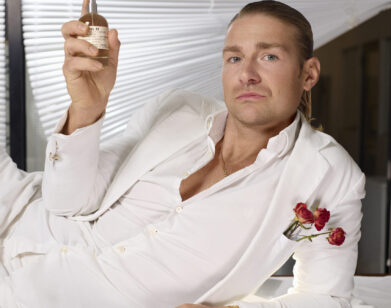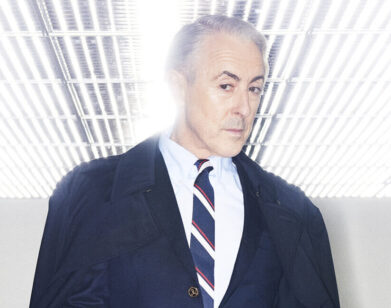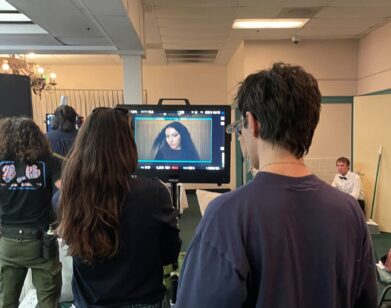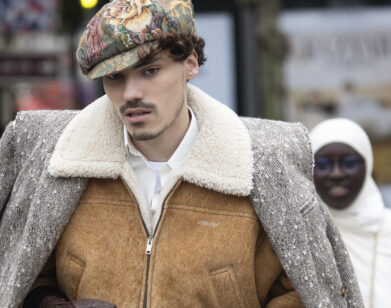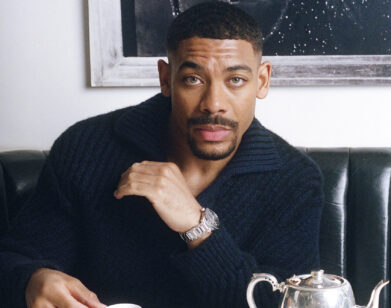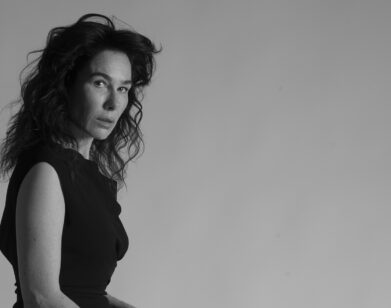BRIT
“I Think I’m Psychic”: Alexa Chung Is Catching a Vibe
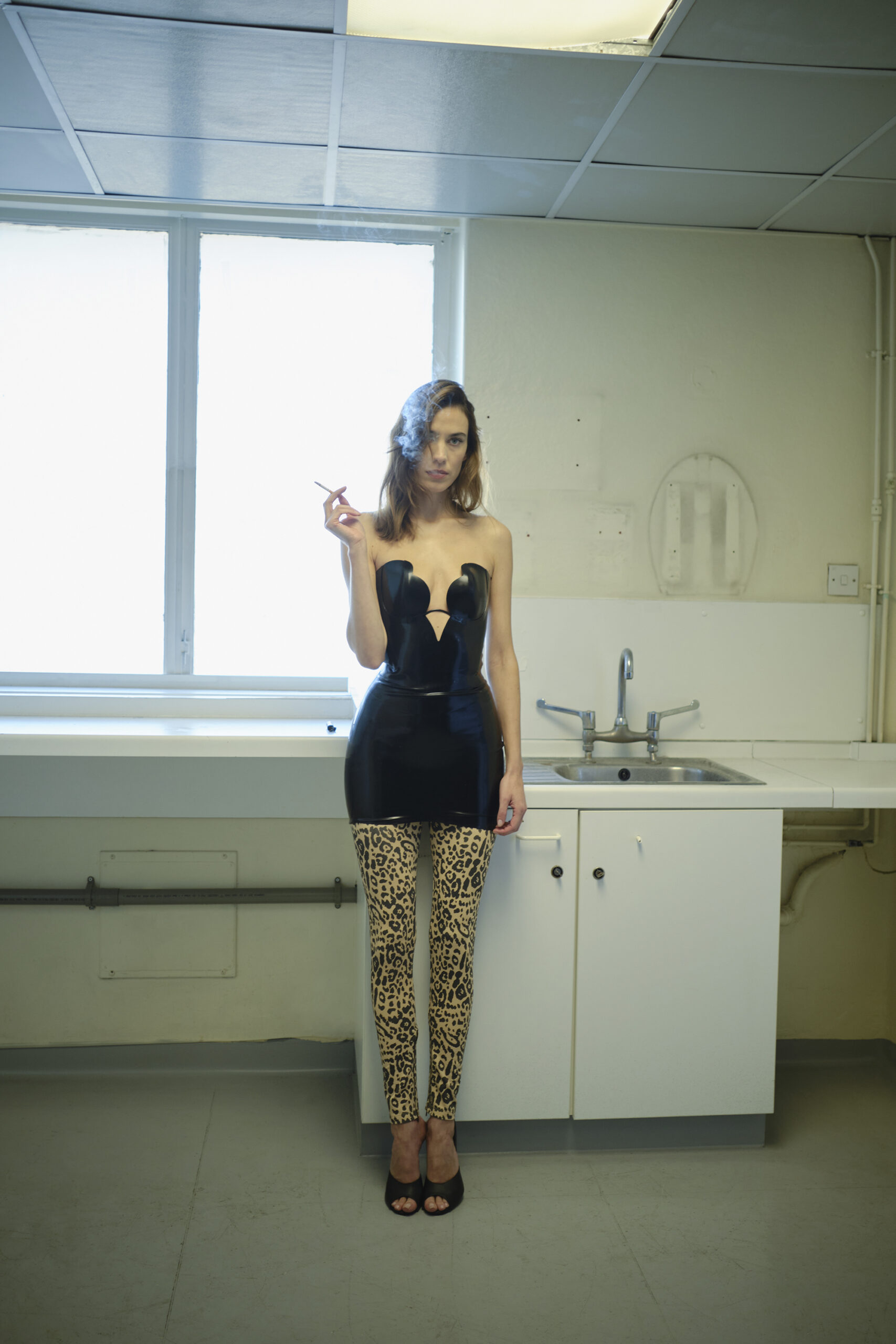
Alexa Chung wears Dress Atsuko Kudo. Leggings Stylist’s Own. Shoes R&M Leathers.
Before she became the titan of twee, Alexa Chung hosted sardonic shows like Popworld, a noughties-era series that brought an ironic hipster pose into the mainstream with deliciously awkward interviews featuring legendary musicians like Moby and Amy Winehouse. Since then, the forever icon has become famous for her Birkin-esque bangs and playful presence on shows like Next in Fashion. But, as the London-based creative tells fellow Brit and Interview editorial director Richard Turley, it’s time for a new era.
———
WEDNESDAY 3 PM OCT. 23, 2024 LONDON
ALEXA CHUNG: Hi Richard.
RICHARD TURLEY: Hi! How are you?
CHUNG: Good, how are you?
TURLEY: I’m good, thank you for doing this.
CHUNG: Of course.
TURLEY: So I wonder if, just for the sake of print media, could you describe the room you’re sitting in at the moment?
CHUNG: I’m in my house in Islington/Hackney, and I renovated it quite recently. I have some Faye Wei Wei prints on the wall. One is of ears, one is of a cowboy. I have a picture from literally the ’40s of my dad as a child grinning. It was his 80th birthday the other day, so I had loads of pictures of him tacked to the wall. A bit like when Alan Partridge walks into the house of a fan and there’s loads of pictures of himself around everywhere. And I was just complaining that I need to find a mirror, but everything looks ugly, so I haven’t got one.
TURLEY: The fireplace is a traditional position for the mirror, which I’m looking at over your shoulder. But you’ve resisted that.
CHUNG: Well, I need one, but I refuse to have one I don’t like, so I’m waiting.
TURLEY: Is it just mirrors that you’re quite specific about? Or furniture generally?
CHUNG: I think furniture generally, but also I started this project as an avid sort of Georgian grandma fan, and now I suddenly want everything to be minimalist and brutalist and I’m trying not to fall into the trap of putting stainless steel everywhere. But I do love the look of that. I know it’s complicated.
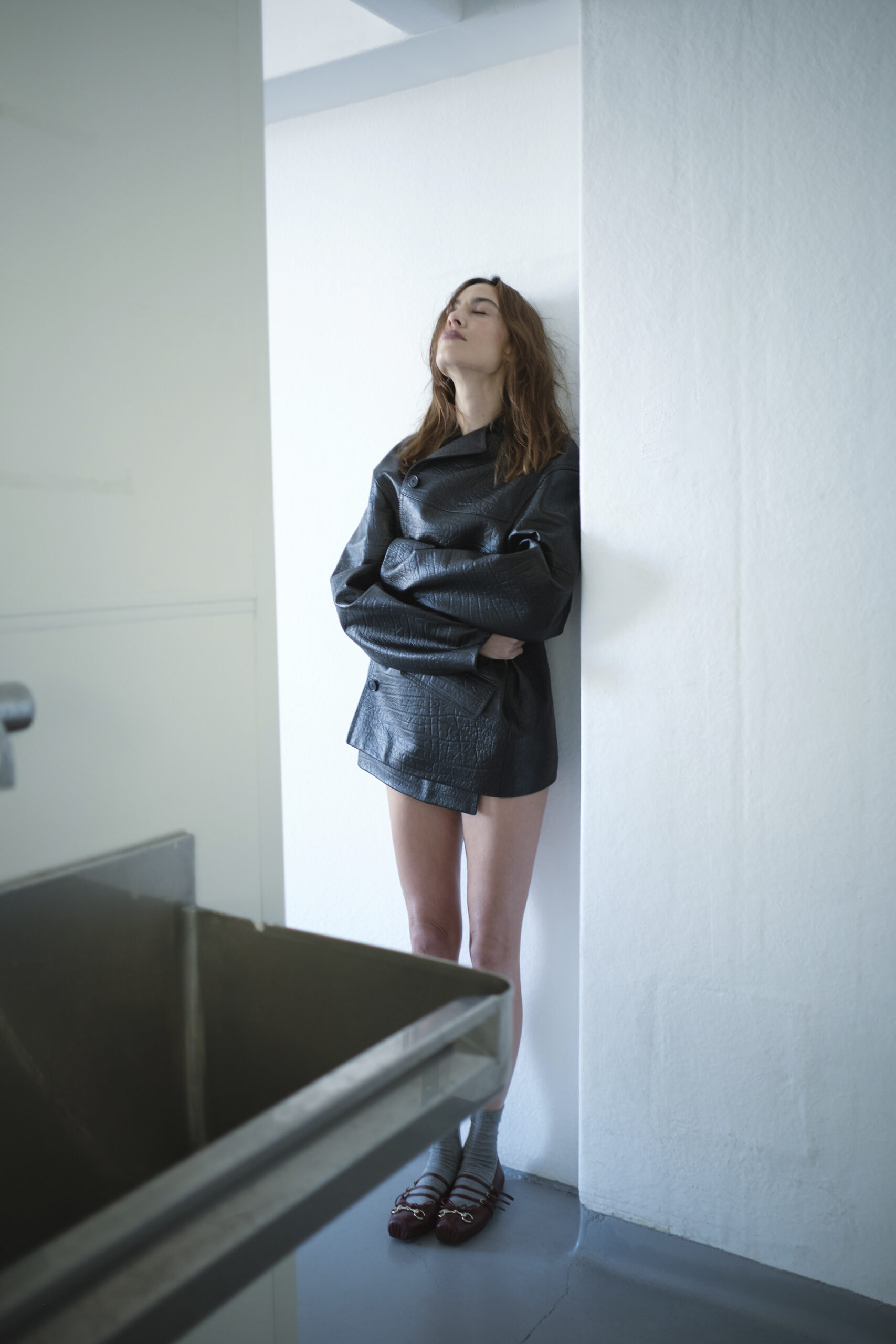
Jacket and Shoes Gucci. Socks (worn throughout) Falke.
TURLEY: It is. And again, a similar question. Can you describe what you’re wearing?
CHUNG: I’m wearing a bullshit outfit, if I’m completely honest. I didn’t think about this being a visual format. [Laughs] I’m wearing a cashmere jumper that I just found has got a stain on it; I believe it’s red wine at the hem. A t-shirt that Chad Moore gave me; it says “Addicts Anonymous” or something— it’s like a made-up rehab, I believe. And some high-sport kick-flare jersey pants, and a Margaret Howell knee-high navy blue sock, because I recently walked into Wolford on the Upper East Side and there was a really posh old lady there, and she was like, “When you see the ankle it’s just abysmal.” I was eavesdropping on her and I was like, “God, you’re right. There’s nothing worse than an ankle.” So I’m covering mine up now.
TURLEY: [Laughs] Okay. And the last question as a setup. Are you selling anything at the moment? We’re just doing this story because we love you, but I don’t want to forgo an opportunity for you to place any wares you may be offering in front of the Interview readership.
CHUNG: Other than my soul, which is an ongoing project, I have a Madewell collection; the second part of it is coming out in November. But I’m just selling vibes.
TURLEY: That’s why we’re featuring you. Because we all love you.
CHUNG: Oh, that’s nice. I felt like I’d been in a fallow period, so it’s nice to—
TURLEY: No, you’re doing great.
CHUNG: Have that love.
TURLEY: Yeah, anyway, I’ve got questions. Question one, have you ever called the fire department?
CHUNG: Yes.
TURLEY: Can you explain?
CHUNG: Big time. I moved to New York. I was 25. I was hosting a talk show for MTV. I liked the idea of the job, but I didn’t really like the idea of leaving London. When I got to America, I was so homesick, and it was such a culture shock in a way I wasn’t expecting, that all I really wanted was a Sunday roast.
TURLEY: I know that feeling.
CHUNG: So my mom and dad came to stay with me in Williamsburg, and my mom was trying to make a Sunday roast, and she reheated the oil in a pan in the oven to make Yorkshire puddings, because that’s how you make this strange cuisine we have here.
TURLEY: It’s a quirky food, for sure.
CHUNG: And instead of putting the oven on normal settings, she put it on broil, which we don’t have in the U.K., and the oven burst into flames. At the time I was writing a column once a week for The Independent, a sort of memo from my life in the States. And I just remember being really pissed off that they were interrupting the flow. Then I walked into the kitchen and was like, “Oh my god.” It’s a story that my parents still tell because they said it was a bit like watching Backdraft: all these really hot firemen—so much hotter than the UK ones—marching up the stairs. It was very dramatic.
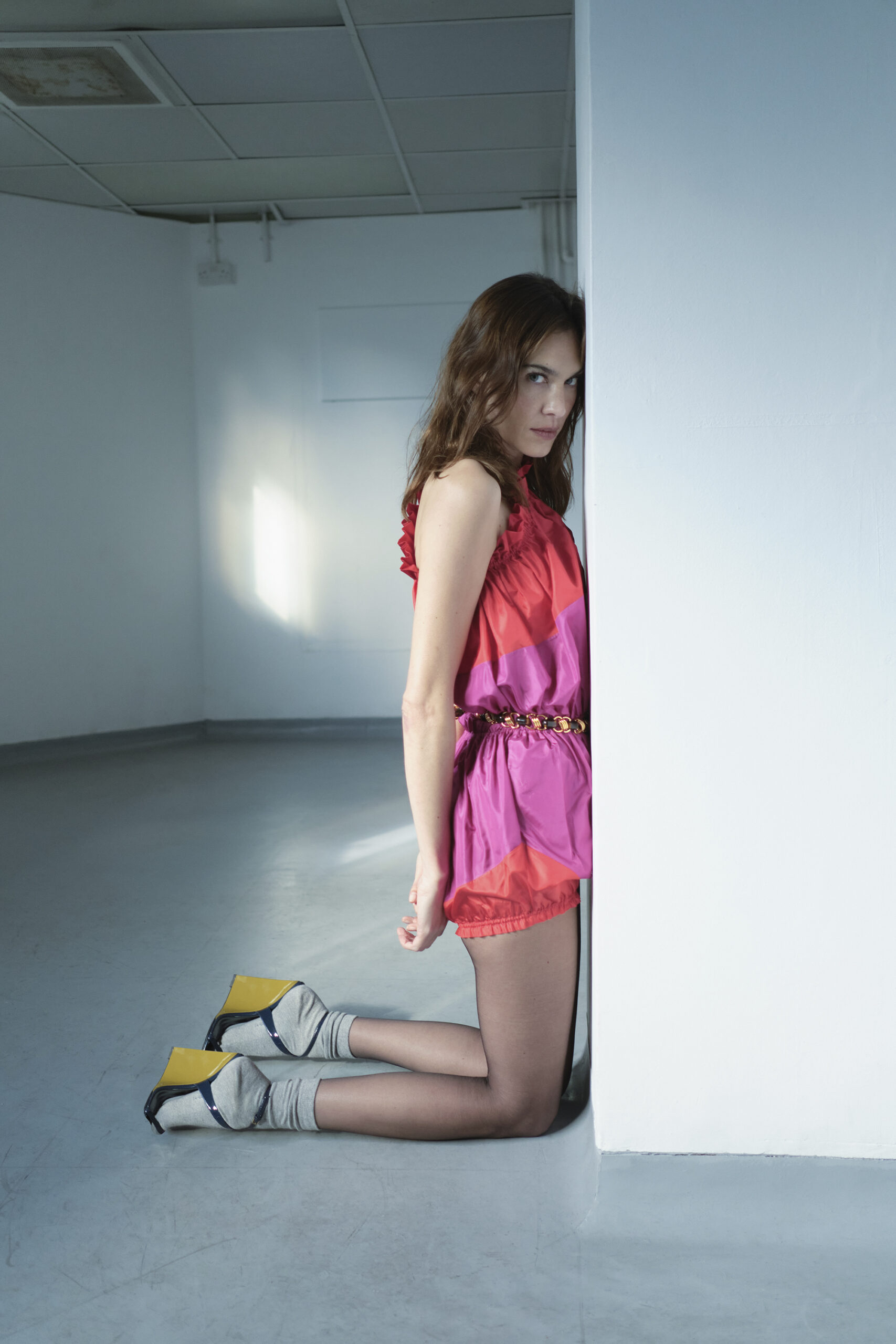
Romper, Belt, Tights, and Shoes Saint Laurent by Anthony Vaccarello.
TURLEY: When summoned, they come in overwhelming force over here, the fire department, although in England we use the word fire brigade. Which is so charming.
CHUNG: One second. This is my American visa arriving. I have to sign for it.
TURLEY: Go! Go! Go!
CHUNG: Hi.
SPEAKER 3: Name?
CHUNG: Alexa.
SPEAKER 3: Sign here.
CHUNG: Thank you, bye. Okay. We’ve got it. We are safe and secured to work in the United States.
TURLEY: [Laughs] Been there, done that. Okay. Do you get backaches?
CHUNG: Not yet. Do you?
TURLEY: Fuck yeah. Look at me, my posture is terrible. I’ve got no core strength. I’m a fading old man hunched over a laptop.
CHUNG: I had a compatible neck freeze with about three people in my office when I had my own fashion line, and it was quite stressful and we all kept going to the same osteopath. There’s something unique about growing up modeling, which means that I’m very accustomed to taking my clothes off and not really thinking about it. So I went to the osteo in Hackney and he said, “Okay, top off and just sit on the bed and I’ll come back.” I took my top and bra off, which in hindsight was a bit much. He walked back in and went, “Oh no, you don’t need to do that.” I was so embarrassed. This was a few years ago and I think about it once a week still.
TURLEY: In what way is that traumatizing? The reveal itself or misreading the instruction?
CHUNG: I just felt sad for myself. I was like, “Yeah, that’s not normal. You’re like a bot.”
TURLEY: There’s a specific sort of vulnerability that kicks in when you visit a doctor.
CHUNG: I guess getting your photo taken all the time, I’m used to oversharing shit. And he very much laid down a boundary and was like, “I do not need to see your nipples because it’s your neck.”
TURLEY: And I remember you said you’ve never had an interaction with a photographer that wasn’t creepy on some level.
CHUNG: Yeah.
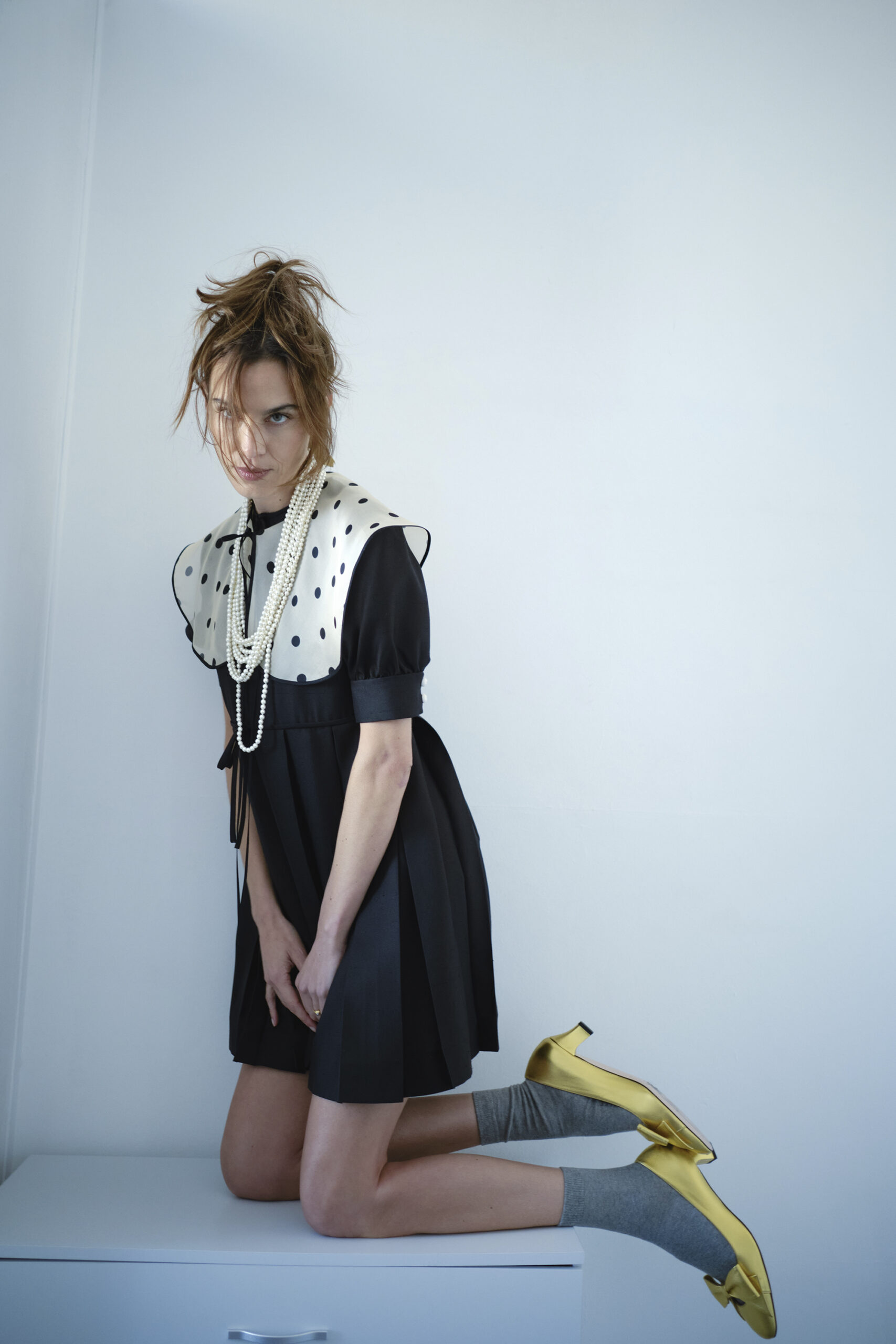
Dress, Necklace, Collar, and Shoes Valentino.
TURLEY: So a similar power dynamic: being told what to do by someone in charge, who’s pointing equipment at you. Okay. Do you feel like the shared neck pain with your coworkers is indicative of empathic feelings? Are you an empath, Alexa?
CHUNG: I think I am, and I went to a Reiki last week and—you know I think I’m psychic?
TURLEY: I don’t, but I’m a believer. Let’s unpack this.
CHUNG: I’m an unexpected psychic person in the sense that I think I’m quite droll and dry and someone that people wouldn’t expect to be an empath or someone that’s reading things that way. But she said if I ever feel weird, like I’m catching other people’s vibes, you literally have to brush it off.
TURLEY: Really? Because you find that overwhelming?
CHUNG: I was actually in a shop, and I was dealing with this dude, and I had to leave because there was something about his vibe that was so overwhelming. When we left, I was saying to my boyfriend, “I think that guy’s really unhappy or there’s something weird going on with him.” It was really affecting me.
TURLEY: Do you think you’re tuning into a past connection you may have had with him, or some kind of link to him from another version of you?
CHUNG: No. It’s less of a quantum leap vibe for me. It’s more that I think it’s very natural to be attuned to other people, because in ancient times that might have served a great purpose. I just re-read Watership Down.
TURLEY: Amazing.
CHUNG: Obviously Fiver is psychic and his job in the group is to pre-warn people. Before sat-nav [GPS] and stuff, I imagine if a group of people were traveling, it was quite helpful to have someone that can see a crisis afoot and be like, “We really shouldn’t go east right now, there’s something weird there.”
TURLEY: It’s funny, isn’t it? Because we’ve grown up in the era of materialism and Richard Dawkins; my education taught me to ignore those things. You’re supposed to reject coincidence, to ignore instinct, but now we’re all in on tuning in. Following where those feelings take you.
CHUNG: Yeah. My friends are like, “You’re a witch.” But it’s more about synchronicity than anything else. I haven’t yet found a way to harness this in any meaningful way.
TURLEY: Do you listen to In Our Time?
CHUNG: No.
TURLEY: It’s that Melvyn Bragg BBC Radio 4 show on Thursday mornings. He did one a few years ago on a 13th-century nun, Hildegard of Bingen, who was divine of spirit, had visions, also a scientist. Fuck, we’re drifting off, not in a bad way, but we’re definitely drifting. Okay, so what torments you?
CHUNG: Ineptitude. I have these peaks of frustration where I’m like, “It’s so simple. Why can’t this person just do this?” I was thinking about it this morning, because I was giving advice to a friend about something else, and I was like, “I think it’s about not taking life too seriously.” That helps combat any frustrations, because ultimately nothing really matters.
TURLEY: For sure. And that you’re creating all these complications around simple things that shouldn’t be?
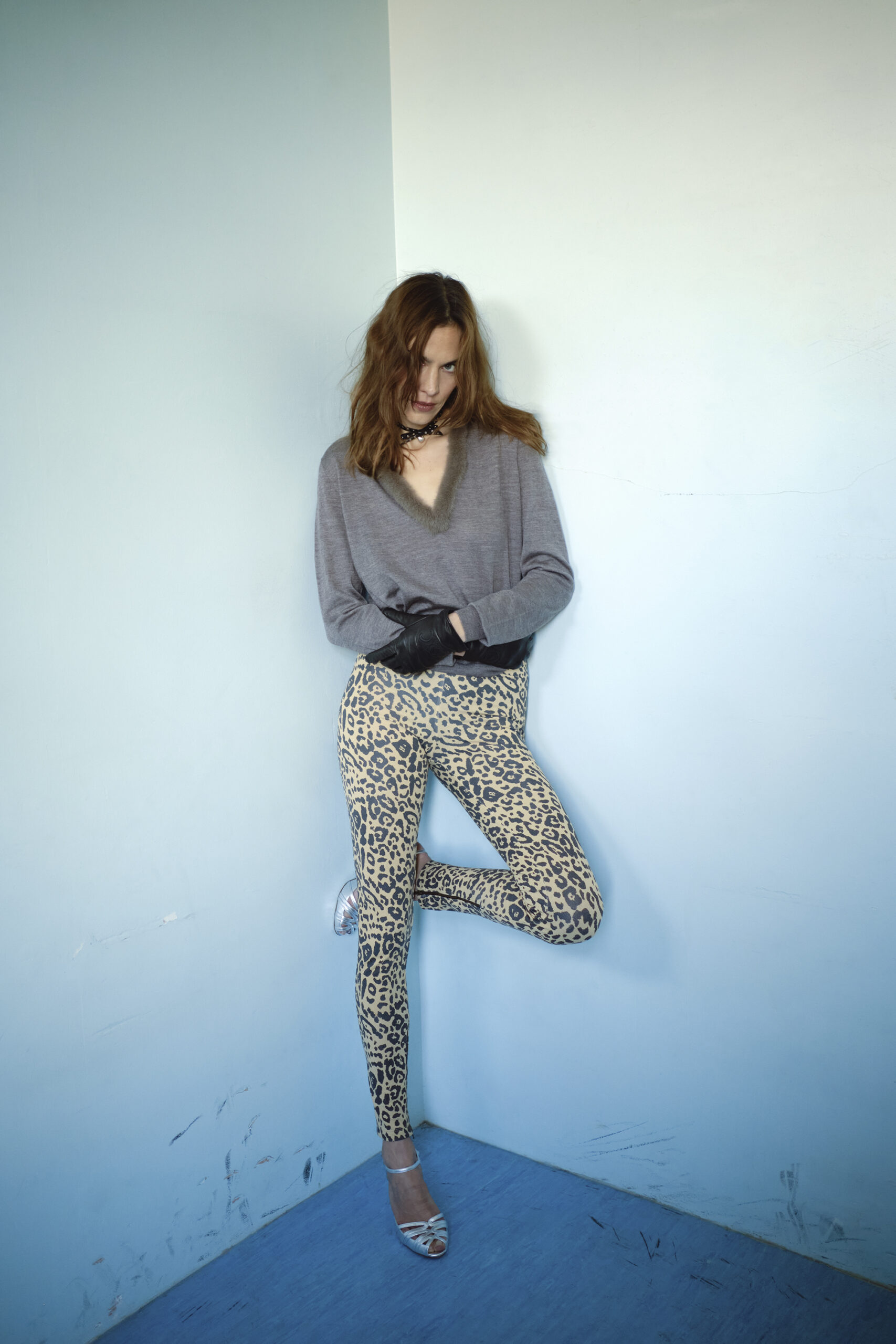
Sweater Fendi. Leggings Stylist’s Own. Necklace R&M Leathers. Gloves Celine by Hedi Slimane. Shoes Manolo Blahnik.
CHUNG: I think that’s what it is. I try really hard; I’m not phoning anything in, even if it’s cooking dinner. I feel like I’m in Limitless or something. But I’m trying to chill that out and just be like, eh, sometimes things are sloppy.
TURLEY: Is that something that you see as a journey back to your youth?
CHUNG: It’s funny you should say that. I grew up in the middle of a field and I had nothing to do for 18 years. Where did you grow up?
TURLEY: Mostly Kent. Also in the middle of a field.
CHUNG: There’s something about long stretches of boredom that I think is really useful. They’ve provided a well of energy for me to draw from, that’s kept me going literally up until this point. Being meditative as you grow up, you have to use your imagination. And then you’re let out the gates and you’re like, “I want to go to every party; I want to see everything.” But I got to the point where I exhausted myself from too much work. So when I speak to this fallow period that I’ve been on—I’ve been more actively at rest. I’m like, “Let’s see what happens if I’m just chilling out and striving for peace.”
TURLEY: Is that a bit of a return to the field?
CHUNG: Exactly. I went to look at a dog last week. I was like, maybe it’s about getting a dog and being forced to slow it down, and what happens then? Maybe I can build up a whole other reservoir of patience and energy that I then can attack the rest of my life with.
TURLEY: I love that idea. So you ready for a new phase?
CHUNG: I think so. There’s something psychological about modeling or presenting or whatever, where you’re just waiting for the phone to ring. I’ve become a creative director, a designer, a writer, but instead of doing things on my terms, or even striving to create something that someone else hasn’t suggested—
TURLEY: I think I’m hearing that you want something that feels like it emanates truly from you?
CHUNG: Not that anything I’ve done hasn’t been genuine, because it’s always come out of a place of authenticity. But I’m interested to know what comes up when I’m really taking a pause, even if it’s drawing on tiles.
TURLEY: There you go.
CHUNG: It’s just middle age, isn’t it?
TURLEY: Yeah. Looking around, wondering, “How did I get here? Am I what I wanted myself to be?” If you could do it all again, would you?

Bra and Shoes R&M Leathers. Skirt N21 by Allesandro Dell’Acqua. Tights Calzedonia.
CHUNG: One thousand percent. I also refuse to believe that the past is better than what’s to come. I was thinking about cultural elders who have enjoyed ultra creativity or really found their lane at an older age, like Leonard Cohen, for instance. Or Fran Lebowitz. I don’t know that your most interesting output has to be when you’re young.
TURLEY: Think the secret is to keep attacking the thing you love, which gets more nuanced and narrow as you age. Most decent ideas begin as some sort of attack on the idea that came before—your early TV career being a good example, where you tore into that post-’90s, stupid pop culture. I think you are, and forever have been, a kind of satirist. Everything you do there is always a wink.
CHUNG: This is very self-indulgent, but if I think about the clothes that I became associated with—I was a TV presenter; it wasn’t really about the outfit. But they were funny because they were of the generation and the society that I grew up in. I was wearing a Barbour jacket because it previously belonged to old posh people, which I wasn’t. I was like, LOL, I’m going to take it and wear it differently. Or loafers or other WASPy items that were amusing to me. But then, over the years, you just become that thing. You do a photo shoot with that brand and they’re like, “Oh brilliant, the loafer.” It’s like Mrs. Prada—she’s always deconstructing uniforms and social codes.
TURLEY: I always remember that thing she said about how she’ll find an object, or a garment, or pair of shoes, which she has a negative reaction to, and then pushes herself to rethink it, to find a way to love it. Fucking genius, right? Maybe the only genius left in fashion; everyone else are just stylists. Okay, this is a question from my friend Meg Superstar, who is a big fan of yours: “How do you deal with your personal style being deeply commodified by the world? Does it make you hate your own style because sometimes people consume it and turn it into weird trend shit?”
CHUNG: If we take what you said about actually approaching things as a game or with humor, I find it even funnier. Then sometimes the ball double bounces, and I’m like, “I can’t possibly wear a shirt buttoned up to the top with a kilt and a flat shoe.” And sometimes it feels quite pervy to put it back on, and then it’s exciting again. I’m like, “Ooh, this is disgusting. I can’t wear the thing that people think I’m going to wear.” So recently I’ve started wearing a duffle coat or dungarees—things I couldn’t touch for years. I now have a perverse attraction to them.
TURLEY: It sounds like you don’t mind your personal style being commodified.

Sweater, Shorts, and Shoes Celine by Hedi Slimane.
CHUNG: I don’t know that it is.
TURLEY: Well, there’s a heavily moodboarded Alexa Chung look, which as I now understand, comes from you playing with clothes that don’t belong to your identity, satirising the people that wear them.But I suppose most satire ends up getting reabsorbed back into culture, but reclassified in different terms.
CHUNG: I guess the same could be said of French-girl style, with the basket, the slight flare jeans, the Carel Mary Janes. That’s probably the most successful export of an image, isn’t it? It’s fun to borrow and pillage from other things and make it your own. Lately I’ve been really attracted to Ludovic de Saint Sernin and Dilara Findikoglu and all these different brands that are doing more of a goth leather look. I’m like, “Maybe that’s the vibe now.”
TURLEY: Okay. A bit of a pivot—
CHUNG: I do think what I’m wearing is sexy. But I guess other people don’t.
TURLEY: What do you mean by that? What is sexy to you?
CHUNG: Well, this jumper is cashmere, it’s very tactile, and it’s sexy to me if you get the references. If you know that this is based on a Dustin Hoffman thing or if you see that I’m Prince Charles on the ski slopes in ’76 or whatever, our minds meet on that ref and that’s really hot to me. So it’s less literal than, “I can see the outline of your ass.”
TURLEY: Yeah. To that end, what is your feeling on yoga pants?
CHUNG: What are yoga pants?
TURLEY: Essentially a very tight pair of exercise pants. I was at a dinner party the other night and a woman was bemoaning the fact that these garments are often so tight that you’ll be sitting on the subway staring at the outline of a woman’s vagina. Maybe that’s more a New York thing as opposed to a London thing. America has way more of a clone army than England.
CHUNG: I don’t see that much of a difference. Social media has just flattened that. But I find it interesting when people take comfort in looking like other people, because I’ve never wanted to look like anyone else. I’m not saying I’m outlandish in some crazy fairy costume, but there’s a saturation point, and once something’s proliferated too much, I’m rejecting it. The idea that we’re all walking around as clones really scares me.
TURLEY: Yeah, that social media—
CHUNG: Or even that there’s such a thing as good taste—that’s a bummer, too. Anything that mimics something is boring.
TURLEY: There were more distinct waves up until about 2010, and then the internet put the entirety of history and art on our phones and we just can’t cope with all that information or know what to do with it, so we end up copying it, screenshotting it, on social media apps, and so maybe that is kind of what culture is right now. A sort of doom loop.

Top, Skirt, Necklace, and Shoes Miu Miu.
CHUNG: Maybe we’re all just struggling to identify. It could be symptomatic of a planet that’s—
TURLEY: Going wrong.
CHUNG: Oh god, hang on, my boyfriend called me, he’s obsessed.
TURLEY: Obsessed by what? Does he need to get in? Maybe he’s trapped somewhere?
CHUNG: No. It’s just that amazingly comfy bit of a relationship where whatever you do, you call each other afterwards. You’re like, “Okay, I just dropped off the cleaning.”
TURLEY: Cheeky question: Are you usually smarter than the people you date?
CHUNG: No, I don’t date people that aren’t smarter than me. I can be emotionally more intelligent, and I think in this instance Tom [Sturridge] is far more well-read than me, but then he would say I’m more intelligent than him, so it can go both ways. My goal is to read his library of books so that I can brain-match him.
TURLEY: Are you living together?
CHUNG: Yeah, there’s two of us in here.
TURLEY: Where do you want to grow old?
CHUNG: I think between now and death I want to do a stint in Paris. Then often I’m watching TV and I’m like, is it Brooklyn again? I did a decade in New York in my twenties. I think it’s such a wonderful thing to do if you get the opportunity—to take yourself apart and reassemble yourself again.
TURLEY: It’s a beautiful thing.
CHUNG: Do you know how young people are really good at claiming their age? When I was growing up, I was never like, “I’m only 22.” I was like, “I’m 22, I’m a grown-ass adult.” I want it to be like that for people of my age, where we’re the new frontier redefining another era. And actually, 40 is not old at all. The thing that makes people old is becoming stagnant or refusing to change.
TURLEY: You just have to keep interested in questioning the things that you love.
CHUNG: One hundred percent. What a lovely chat. Wasn’t expecting it to get as witchy, but I’m into it.
TURLEY: Same. It was so nice talking to you.
CHUNG: Yeah, lovely to talk to you.
TURLEY: Good luck with the shoot tomorrow.
CHUNG: Okay, take care.
TURLEY: Bye Alexa.
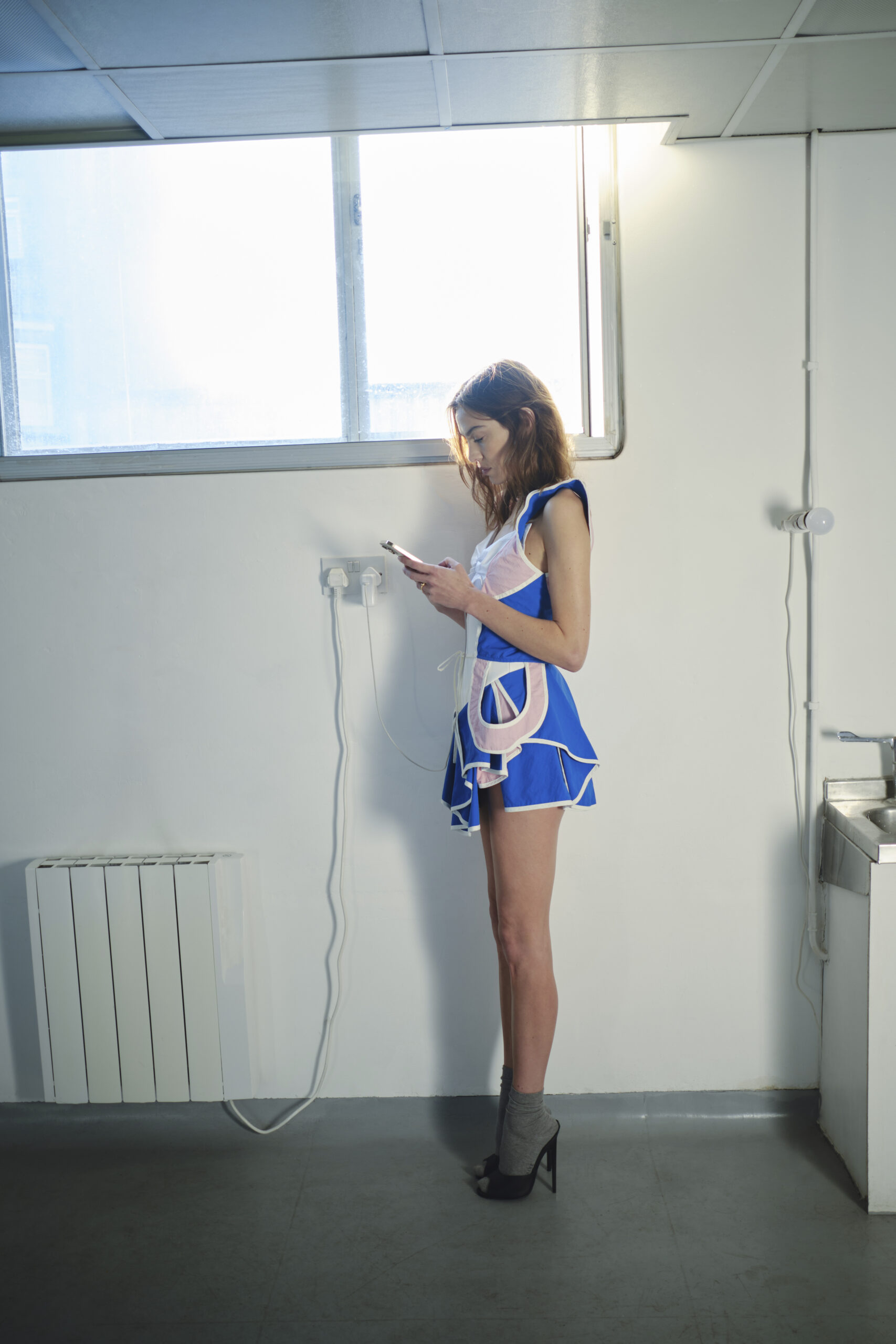
Dress Ashley Williams. Shoes R&M Leathers.
———
Hair: Pål Berdahl using Oribe at LGA Management.
Makeup: Crystabel Riley using Jones Road Beauty at Julian Watson Agency.
Nails: Cherrie Snow using Joonbyrd at Snow Creatives.
Photography Assistant: Rennato Oliveria.
Fashion Assistants: Amelia Howells and Alfie.
Hair Assistant: Masaki Kameda.
Production Management: Kevin Cheung.
Location: White Space Studio SKX.

